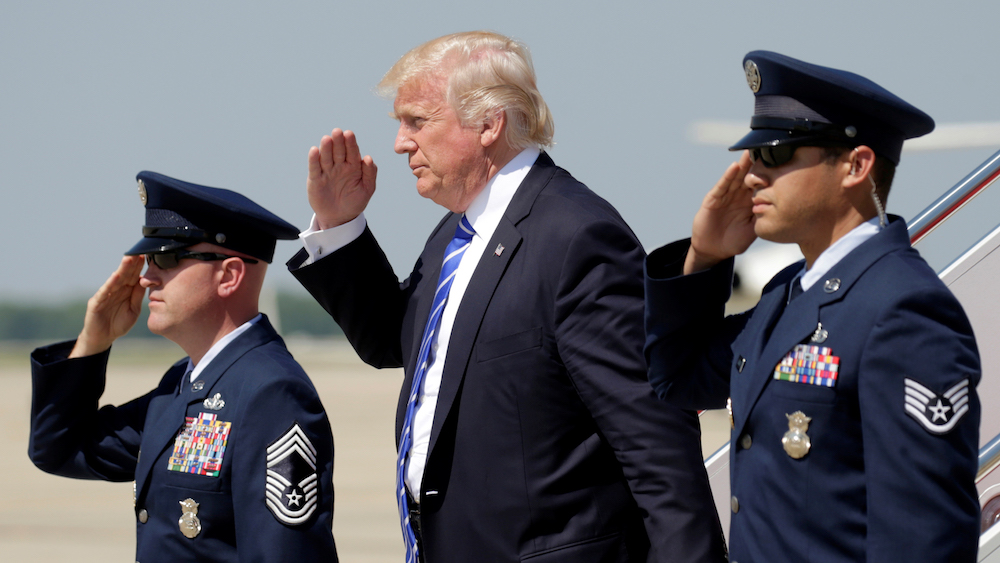Chaos has plagued Donald Trump’s young administration. As he arrives in Brussels to meet with European allies, there are growing fears over who could fill the vacuum while Trump is otherwise engaged.
Brussels is no stranger to handling security for visiting foreign leaders. At least four times a year, the leaders of every country in the European Union gather close to the city center – and yet life continues. The visit of a US president, however, is a different story. The entire city will shut down. Lucky for the Belgians, Trump is arriving on a public holiday.
In addition to the world’s largest security detail, Donald Trump will also bring with him the baggage of a ballooning political scandal. Recent revelations over collusion with Russia, subverting the course of an investigation into that collusion, and passing on classified information to the Russians are likely to hang over Trump as he attends a summit of NATO members. The new information revealed last week has magnified impeachment speculation in Washington to a fever pitch.
It is no secret that most Europeans were not happy about Trump’s election. During the campaign he denigrated the EU and advocated for its dissolution. He called NATO obsolete and suggested the US would not honor its commitment to defend members.
One might expect, therefore, that European leaders would be welcoming the possibility of impeachment. But Europeans are far more concerned over a long-drawn-out investigation, and what a possible impeachment process would mean for global security. A world in which the most powerful nation is distracted by domestic political scandal is an inherently more dangerous one. It might render the US unable to act decisively in the event of a sudden global conflict. And there is increasing anxiety about who might be vying to fill the power vacuum in such a world.
False Hope
Before Trump took the decision to fire James Comey, the FBI director leading the investigation into the US president’s ties to Russia, Europeans were just starting to feel reassured. Trump appeared to have done an about-face on NATO, suddenly deciding it is no longer obsolete. The EU, too, is now A-OK.
Trump seems to have withdrawn his previous support of Europe’s far-right populists after they lost elections in France and the Netherlands, and as their poll numbers sink in Germany. He also appears to be backtracking on his promise to pull the US out of the nuclear control deal with Iran, an agreement that was negotiated by the Obama administration alongside European allies.
Were it not for the escalating Russia scandal at home, Trump might have been facing a somewhat reassured audience in Brussels. But given the serious charges against him – particularly the allegation that he passed on top-secret intelligence to Russia and did not share it with US allies in Europe – it is likely going to be a skeptical room. More importantly, it is going to be a very nervous room.
European leaders will be desperately seeking reassurance from Trump that his “Russia thing” is not going to paralyze the US. Of course, this is not a reassurance Trump can provide.
A Nervous Bunch
Last week Foreign Policy magazine reported that America’s NATO partners are tailoring the meeting to accommodate the US president’s notoriously short attention span. They are limiting their speeches to between two and four minutes. The Economist and Politico have reported that NATO allies are walking on eggshells, terrified of upsetting a president who has amassed a global reputation for being vindictive.
Trump is expected to repeat his demand that European NATO members increase their defense spending, arguing that the US should not be shouldering the vast majority of the burden in protecting the continent. The allies will ask Trump to recommit to NATO’s Article 5, a founding principle stipulating that an attack on one member is an attack on all. He is the first US president who has not explicitly endorsed that principle since NATO was founded in 1949.
To underline that point, NATO has asked Trump to dedicate a memorial that has been constructed from remnants of the World Trade Center. The monument was built at the alliance’s headquarters in Brussels and it specifically marks the invocation of Article 5 after the September 11, 2001 attacks – the only time the article has ever been invoked in NATO’s history. America’s NATO allies participated in the invasion of Afghanistan because of that invocation. By placing him in front of that memorial, Europeans hope to remind Trump that there is a favor to return.
He is not expected to do so. He may be too distracted to notice.







